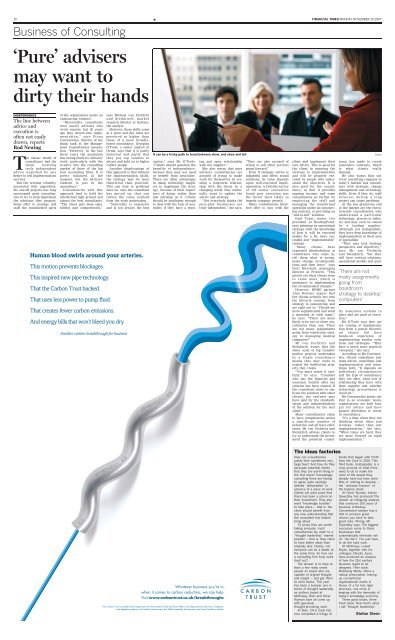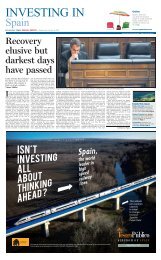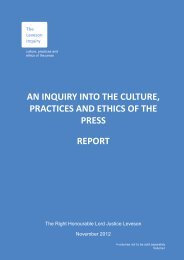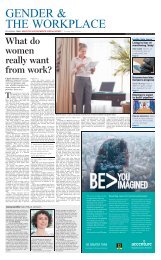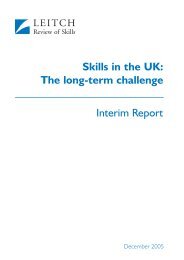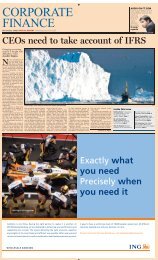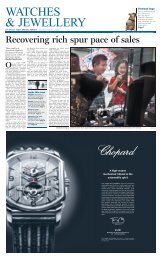What are consultants for? - Financial Times - FT.com
What are consultants for? - Financial Times - FT.com
What are consultants for? - Financial Times - FT.com
Create successful ePaper yourself
Turn your PDF publications into a flip-book with our unique Google optimized e-Paper software.
10 ★ FINANCIALTIMESMONDAYNOVEMBER 19 2007<br />
Business of Consulting<br />
‘Pure’ advisers<br />
may want to<br />
dirty their hands<br />
INDEPENDENCE<br />
The line between<br />
advice and<br />
execution is<br />
often not easily<br />
drawn, reports<br />
Rod Newing<br />
The classic model of<br />
consultancy had the<br />
client receiving<br />
truly independent<br />
advice unsullied by any<br />
desire to sell implementation<br />
services.<br />
But the revenue volatility<br />
associated with unpredictable<br />
one-off projects has long<br />
encouraged most consultancies<br />
to try to help implement<br />
the solutions they propose.<br />
Some offer to manage and<br />
staff the trans<strong>for</strong>med parts<br />
of the organisation under an<br />
outsourcing contract.<br />
“Historically, <strong>consultants</strong><br />
were purely advisers who<br />
wrote reports, but 20 years<br />
ago they moved into implementation,”<br />
says Fiona<br />
Czerniawska, director of the<br />
think tank at the Management<br />
Consultancies Association.<br />
“However, in the last<br />
three years the pendulum<br />
has swung [back] to advisory<br />
work, particularly with the<br />
re-entry into the consulting<br />
market of three of the big<br />
four accounting firms. It is<br />
pretty balanced at the<br />
moment, but the advisory<br />
element is just in the<br />
ascendency.”<br />
Consultancies with this<br />
approach tend to hold the<br />
intellectual high ground and<br />
attract the best <strong>consultants</strong>.<br />
“The client gets deep capabilities<br />
and <strong>com</strong>petencies,”<br />
says Michael von Uechtritz<br />
und Steinkirch, market<br />
research director at Gartner,<br />
the analyst.<br />
However, these skills <strong>com</strong>e<br />
at a price and day rates <strong>are</strong><br />
perceived as higher than<br />
those of a more broadlybased<br />
consultancy. Georgina<br />
O’Toole, a senior analyst at<br />
Ovum, says that it is partly<br />
historical and partly that<br />
they pay top salaries to<br />
attract and hold on to higher<br />
calibre people.<br />
Another disadvantage of<br />
this approach is that without<br />
the implementation skills,<br />
the strategy may be more<br />
theoretical than practical.<br />
This can lead to problems<br />
later on, once the consultant<br />
has moved on, that can<br />
reduce the value realised<br />
from the work undertaken.<br />
“Neutrality is expensive<br />
and is not always the best<br />
Itcanbeatrickypathtotreadbetweenshow,andshowandtell Corbis<br />
option,” says Ms O’Toole.<br />
“Clients should question the<br />
benefits of independence,<br />
because they may not need<br />
or benefit from neutrality.<br />
There <strong>are</strong> often advantages<br />
in using technology suppliers<br />
to implement the strategy,<br />
because of their experience<br />
of doing, rather than<br />
just advising on it. Clients<br />
should be intelligent enough<br />
to deal with the lack of neutrality<br />
if they have a trust-<br />
ing and open relationship<br />
with the supplier.”<br />
She also warns that pure<br />
advisory consultancies <strong>are</strong><br />
accused of trying to make<br />
work <strong>for</strong> themselves by creating<br />
a long-term relationship<br />
with the client. In a<br />
changing world, they continually<br />
want to update the<br />
advice and strategy.<br />
“Not everybody thinks the<br />
pure-play businesses <strong>are</strong><br />
truly independent,” she says.<br />
“They <strong>are</strong> also accused of<br />
trying to sell other services<br />
going <strong>for</strong>ward.”<br />
Even if strategic advice is<br />
insightful and offers sound<br />
solutions, its value depends<br />
upon well-executed implementation.<br />
A Deloitte survey<br />
of 120 senior executives<br />
found poor execution was<br />
the factor most likely to<br />
impede <strong>com</strong>pany growth.<br />
Many consultancies there<strong>for</strong>e<br />
offer to stay with the<br />
client and implement their<br />
own advice. This is good <strong>for</strong><br />
the client in ensuring the<br />
strategy is implementable<br />
and will be properly executed<br />
by people who understand<br />
the objectives. It is<br />
also good <strong>for</strong> the consultancy,<br />
in that it provides<br />
ongoing in<strong>com</strong>e, and some<br />
consultancies go further by<br />
employing the staff and<br />
managing the trans<strong>for</strong>med<br />
operation under an outsourcing<br />
contract, so providing an<br />
“end-to-end” solution.<br />
Paul Toner, senior vice<br />
president at BearingPoint,<br />
says planning an operational<br />
strategy with the knowledge<br />
of how it will be executed<br />
makes <strong>for</strong> a far more successful<br />
and “implementable”<br />
strategy.<br />
“Many clients have<br />
expressed dissatisfaction at<br />
<strong>consultants</strong> who <strong>com</strong>e in,<br />
tell them what is wrong,<br />
make change re<strong>com</strong>mendations<br />
and then leave,” says<br />
Paul Marshall, managing<br />
director at Protiviti. “This<br />
misses out what clients seem<br />
to value most, which is<br />
assistance in implementing<br />
the re<strong>com</strong>mended changes.”<br />
However, KPMG partner<br />
Alan Downey argues that<br />
few clients actually buy into<br />
the lifecycle concept, from<br />
strategy to outsourcing, and<br />
<strong>are</strong> right not to. “Clients <strong>are</strong><br />
more sophisticated and want<br />
a specialist at each stage,”<br />
he says. “There <strong>are</strong> more<br />
likely to be two or three consultancies<br />
than one. There<br />
<strong>are</strong> not many assignments<br />
going from boardroom strategy<br />
to managing desktop<br />
<strong>com</strong>puters!”<br />
Mr von Uechtritz und<br />
Steinkirch warns that the<br />
sheer scale of big trans<strong>for</strong>mation<br />
projects undertaken<br />
by a single consultancy<br />
means they may want to<br />
exploit the intellectual property<br />
they create.<br />
“You must watch it c<strong>are</strong>fully,”<br />
he says. “Consider<br />
who has the financial and<br />
economic benefit after the<br />
solution has been created. If<br />
the consultant starts to replicate<br />
the solution with other<br />
clients, the end-user may<br />
have paid <strong>for</strong> the standardisation<br />
and industrialisation<br />
of the solution <strong>for</strong> the next<br />
client.”<br />
Many consultancies claim<br />
to have <strong>com</strong>petencies across<br />
a significant number of<br />
industries and all have references.<br />
Mr von Uechtritz und<br />
Steinkirch advises clients to<br />
try to understand the investment<br />
the potential consul-<br />
Theideasfactories<br />
How can consultancies<br />
justify their sometimes very<br />
large fees? And how do they<br />
persuade potential clients<br />
that they <strong>are</strong> worth hiring in<br />
the first place? Increasingly<br />
consulting firms <strong>are</strong> having<br />
to agree quite c<strong>are</strong>fully<br />
defined “deliverables” in<br />
advance of a piece of work.<br />
Clients will want proof that<br />
there has been a return on<br />
their investment. They also<br />
want “knowledge transfer”<br />
to take place – that is, the<br />
client should benefit from<br />
any new understanding that<br />
the consultant has helped<br />
bring about.<br />
To prove they <strong>are</strong> worth<br />
taking seriously, most<br />
consultancies lay claim to a<br />
“thought leadership” market<br />
position – that is, they claim<br />
to have better ideas than<br />
anybody else. Clearly, not<br />
everyone can be a leader at<br />
the same time. So how can<br />
a consulting firm truly mark<br />
itself out?<br />
The answer is to have at<br />
least a few really smart<br />
people on board who <strong>are</strong><br />
capable of original thought<br />
and insight – and get them<br />
to write books. This year<br />
has been a bumper one in<br />
terms of thought leadership,<br />
as authors based at<br />
McKinsey, Bain and Oliver<br />
Wyman have all <strong>com</strong>e up<br />
with genuinely<br />
thoughtprovoking work.<br />
At Bain, Chris Zook has<br />
now <strong>com</strong>pleted a trilogy of<br />
tancy has made to create<br />
innovative solutions, which<br />
is what clients really<br />
demand.<br />
He also warns that not<br />
every consulting <strong>com</strong>pany in<br />
today’s market has <strong>consultants</strong><br />
with strategic, change<br />
management and technology<br />
skills. Even if they do, staff<br />
turnover during a long<br />
project can cause problems.<br />
At the less glamorous end<br />
of the market <strong>are</strong> the execution-only<br />
consultancies, who<br />
understand a particular<br />
technology, process or industry<br />
and may even be owned<br />
by a leading supplier.<br />
Although not independent,<br />
they have deep knowledge of<br />
implementation in their <strong>are</strong>a<br />
of specialism.<br />
“They may lack strategy<br />
perspective and objectivity,”<br />
says Mr von Uechtritz<br />
und Steinkirch, “but they<br />
will have vertical solutions,<br />
operational models and qual-<br />
‘There <strong>are</strong> not<br />
many assignments<br />
going from<br />
boardroom<br />
strategy to desktop<br />
<strong>com</strong>puters’<br />
ity assurance systems in<br />
place and <strong>are</strong> good at execution.”<br />
Ms O’Toole says they <strong>are</strong><br />
not <strong>com</strong>ing at implementation<br />
from a purely theoretical<br />
stance, but have<br />
hands-on experience of<br />
implementing similar solutions<br />
and strategies. “They<br />
have a much more practical<br />
viewpoint,” she says.<br />
According to Ms Czerniawska,<br />
clients sometimes just<br />
want advice, sometimes just<br />
implementation and sometimes<br />
both. “It depends on<br />
individual circumstances<br />
and the type of consultancy<br />
they <strong>are</strong> after, what sort of<br />
relationship they have with<br />
their supplier and whether<br />
technology procurement is<br />
involved.”<br />
Ms Czerniawska points out<br />
that in an economic boom,<br />
organisations <strong>are</strong> both hungry<br />
<strong>for</strong> advice and have<br />
greater discretion to invest<br />
in consultancy.<br />
“It’s a time when they <strong>are</strong><br />
thinking about ideas and<br />
strategy, rather than just<br />
implementation,” she says.<br />
“When times <strong>are</strong> hard, they<br />
<strong>are</strong> more focused on rapid<br />
implementation.”<br />
books that began with Profit<br />
from the Core in 2001. This<br />
third book, Unstoppable, is a<br />
crisp account of what firms<br />
need to do to make the<br />
most of the assets they<br />
already have but have done<br />
little or nothing to develop –<br />
the “unknown knowns” of<br />
the balance sheet.<br />
At Oliver Wyman, Adrian<br />
Slywotzky has produced The<br />
Upside, an intriguing analysis<br />
that overturns 100 years of<br />
business orthodoxy.<br />
Conventional wisdom has it<br />
that to produce great<br />
returns you have to take<br />
great risks. Wrong, Mr<br />
Slywotzky says. The biggest<br />
successes <strong>com</strong>e to those<br />
businesses that<br />
systematically eliminate risk<br />
(or “derisk”). You just have<br />
to do the hard work.<br />
At McKinsey, Lowell<br />
Bryan, together with his<br />
colleague Claudia Joyce,<br />
have produced an analysis<br />
of how the 21st century<br />
business ought to be<br />
designed. Their book,<br />
Mobilising Minds, offers a<br />
radical prescription, tearing<br />
up conventional<br />
organisational charts in<br />
favour of a far less rigid<br />
structure, one more in<br />
keeping with the demands of<br />
today’s knowledge economy.<br />
Three good books, three<br />
fresh ideas. Now that’s what<br />
I call “thought leadership”.<br />
Stefan Stern


